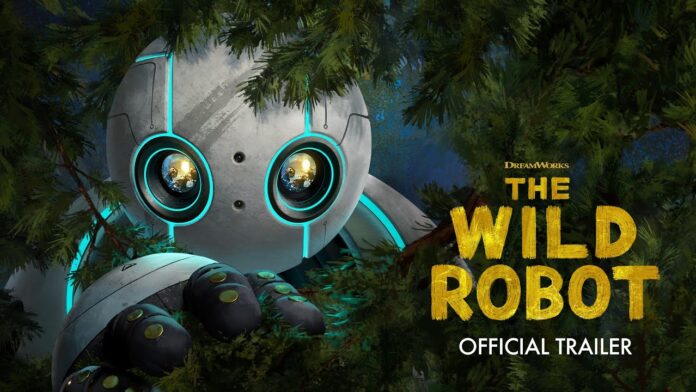Dreamworks Animation’s latest film blends cutting-edge technology with heartfelt storytelling, delivering a visual feast that resonates emotionally.
In a world where animated films often dazzle audiences with technological marvels, The Wild Robot stands out as a poignant artistic triumph. Released by DreamWorks Animation to coincide with the studio’s 30th anniversary, this film offers a breathtaking blend of traditional artistry and modern innovation, evoking the same emotional depth that made classics like The Prince of Egypt a cultural touchstone.
Set against the backdrop of a beautifully rendered, thickly forested isle, the film introduces us to Roz, voiced by Lupita Nyong’o. The narrative begins as Roz washes ashore one stormy night, awakening to a grey, gravelly beach framed by towering basalt columns. The artistry of the film is immediately apparent as the landscape comes to life through a unique visual style that merges computer-generated imagery with hand-painted textures. The columns, depicted with swathes of silvery gouache and flecks of moss, create a vivid, three-dimensional environment that feels both immersive and organic.
The Wild Robot showcases a technique reminiscent of the visually stunning Spider-Verse films, yet it transcends mere novelty. Within moments of Roz scaling a cliff, the artistry transforms from an impressive gimmick into a seamless integration of technology and tradition, suggesting a return to the roots of animation.
Directed by Chris Sanders, known for his work on both How to Train Your Dragon and Disney classics, the film adapts the first book in Peter Brown’s beloved children’s trilogy. Its narrative follows Roz’s journey from an out-of-place robot to a nurturing figure as she adopts an orphaned gosling named Brightbill, voiced by Kit Connor. The simplicity of the plot is beautifully complemented by its emotional depth, culminating in a heart-wrenching climax reminiscent of Pixar’s Inside Out.
What truly elevates The Wild Robot is its exceptional storytelling, which weaves emotional arcs through the film’s stunning visuals. As Roz assumes her maternal role, her initially pristine robotic form becomes weathered and scuffed, mirroring the emotional and physical toll of her new responsibilities. This transformation is not just a visual gimmick; it symbolizes growth and resilience, reflecting the organic beauty that comes from genuine care and nurturing.
Roz’s design pays homage to iconic animated figures from the genre’s history. She evokes the spirit of Hayao Miyazaki’s beloved gardener robots from Castle in the Sky and Brad Bird’s The Iron Giant, positioning her within a lineage of memorable mechanical characters. The film features several serene tableau shots of Roz in her natural surroundings, allowing audiences to appreciate the quiet beauty of her journey.
Despite its tender themes, The Wild Robot doesn’t shy away from the dynamic storytelling that has become a hallmark of DreamWorks productions. The film opens with playful antics, establishing a lively tone before delving into deeper emotional territory. The climax, marked by the arrival of Roz’s manufacturers, amplifies the film’s already striking visuals, propelling them into an expressive, almost surreal realm.In an era when animated films are often celebrated for their technological prowess, The Wild Robot reminds us of the power of artistry and emotional storytelling. With its rich visual language and heartfelt narrative, DreamWorks has crafted a film that not only entertains but also resonates on a profoundly human level. It’s a reminder that the most moving animations transcend mere spectacle; they connect with audiences through the shared experiences of love, loss, and growth.
